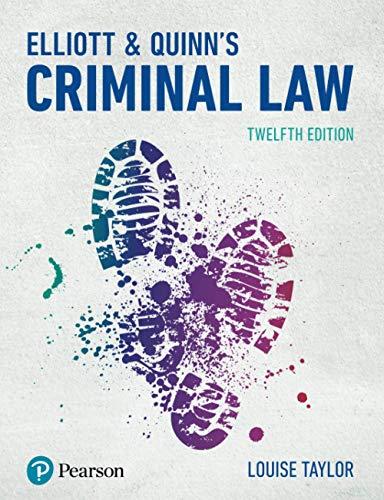Question
William Smith is a thirty year old applicant to the Massachusetts School of Law. He is a graduate of UMASS Boston where he majored in
William Smith is a thirty year old applicant to the Massachusetts School of Law. He is a graduate of UMASS Boston where he majored in communications and minored in political science. His cumulative GPA upon graduation was a 2.5, up .2 from his junior year. Smith now works for a cable television company in Boston where he supervises and schedules the installation crews. He is a divorced father of two children who he visits on the weekends.
Smith grew up in a working-class family and while in high school he held a variety of jobs to help his parents with the bills. And although he never showed much interest in academics in high school, the fact that he had to work often got in the way of his studies. He graduated from high school below the middle of a large public school class. Still, many of his teachers and his guidance counselor reported that Smith had the ability to do excellent work in school.
Smith was lackadaisical in his approach to college applications. He did not score well on his SATs, in part because he spent the night before the exam working at a convenience store. However, Smith also failed to submit many of his college applications on time; it was only due to UMASS Boston's policy of rolling admissions that he was able to matriculate.
Once in college, Smith's approach to academics changed. Free for the first time to take classes of his own selection, he enrolled in film and radio classes, in hopes of beginning a career in the communications industry. He received grades of B+ in four classes over the first year.
In his sophomore year, Smith joined a fraternity, Kappa Epsilon Gamma. Over the course of his second year, Smith found himself spending more and more time at the fraternity. As a result, his GPA dropped to 1.7, and he was placed on academic probation. In his junior year, however, his grades improved and he was taken off probation.
Early in his senior year Smith's fraternity hosted a party at which large amounts of alcohol were served to minors. When the party spilled into the street neighbors called the local police. When the police arrived Smith was clearly intoxicated and he was belligerent when they tried to break up the party. One officer claimed that Smith called him a "pig". The school charged Smith and several others with serving alcohol to underage drinkers and for conduct unbecoming a student. He was suspended from school for one year. They also required that he seek alcohol counseling before he was readmitted to the school.
During his year away from school Smith began working at the cable company where he is currently employed. He attended occasional meetings of Alcoholics Anonymous, but since he did not feel he had a drinking problem he stopped after only four months. After his year away
from school he was readmitted to the night program at UMASS Boston. He continued to work for the cable company.
In his final year of college Smith worked extremely hard and his grades improved. He also found that he was interested in economics and government, in part because he had been active in the union at the cable company. During his senior year he took only one communications course and concentrated on his minor course of study. He graduated in the middle of his class.
Once he finished college Smith continued to work at the cable company. After three years as an installer he was promoted to team leader and was later promoted to district supervisor. As such, he is responsible for scheduling installations, managing work crews, and promoting installation team leaders. Recently, allegations have been made that Smith does not promote minority installers to the position of team leader. Because there seems to be circumstantial evidence to support this claim, the company is currently conducting an investigation. No decision has yet been reached.
One year ago Smith decided to channel his long-standing interest in government into a race for representative in the state legislature. He found that he was a good speaker and could understand the concerns of his district. While campaigning he learned that his opponent, who at that time was a member of the school board, actually sent her children to a private school. Smith's campaign advisors urged him to make an issue of this apparent hypocrisy. Smith decided that there were other issues that needed to be addressed and he did not talk about the school board issue. As it turned out, Smith's opponent won the race but has proved to be an unsatisfactory representative. Smith and several of the district members now wishes that he had spoke up during the campaign, even if that meant using negative advertisements.
On his application to the Massachusetts School of Law Smith stated the following reasons for wanting to become an attorney:
1. Career advancement.
2. A desire to "weed out" those public officials who are unfit for public service.
3. A legal education will provide intellectual stimulation.
QUESTIONS
QUESTION #1: In essay format, state all the reasons why William Smith should be admitted to MSLAW.
QUESTION #2: In essay format, state all the reasons why William Smith should be denied admission to MSLAW.
Step by Step Solution
There are 3 Steps involved in it
Step: 1

Get Instant Access to Expert-Tailored Solutions
See step-by-step solutions with expert insights and AI powered tools for academic success
Step: 2

Step: 3

Ace Your Homework with AI
Get the answers you need in no time with our AI-driven, step-by-step assistance
Get Started


